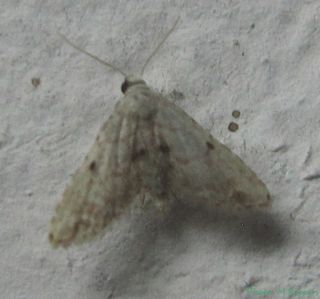
The Tortricidae are a family of moths, commonly known as tortrix moths or leafroller moths, in the order Lepidoptera. This large family has over 10,350 species described, and is the sole member of the superfamily Tortricoidea, although the genus Heliocosma is sometimes placed within this superfamily. Many of these are economically important pests. Olethreutidae is a junior synonym. The typical resting posture is with the wings folded back, producing a rather rounded profile.
Geshna is a monotypic moth genus of the family Crambidae described by Harrison Gray Dyar Jr. in 1906. It contains only one species, Geshna cannalis, the lesser canna leafroller, described by Altus Lacy Quaintance in 1898. It is found in North America, where it has been recorded from Florida, Mississippi, South Carolina, North Carolina and Tennessee. It has also been recorded from Costa Rica and Cuba.

Araeopteron is a genus of moths of the family Erebidae. The genus was erected by George Hampson in 1893.
Dasyblemma is a monotypic moth genus of the family Erebidae. Its only species, Dasyblemma straminea, is known from the US state of California, where its type locality was Palm Springs. Both the genus and the species were first described by Harrison Gray Dyar Jr. in 1923.

Abagrotis scopeops is a moth of the family Noctuidae first described by Harrison Gray Dyar Jr. in 1904. It is found in North America from southern British Columbia, south through western Montana, Idaho, Utah and Nevada down to southern California.

Archips is a genus of tortrix moths the tribe Archipini. Species include the oak leaf roller, which eats the leaves of oak trees.

Archips semiferanus is a species of moth in the family Tortricidae, and one of several species of moth commonly known as oak leafroller or oak leaf roller. The larvae feed on the leaves of oak trees in the eastern United States and southeastern Canada and are a major defoliator of oak trees, which can lead to tree mortality. In Pennsylvania in the late 1960s and early 1970s, oak leafrollers defoliated over 1,045,000 acres (423,000 ha).
Oak leafroller can refer to several species of moth that feed on leaves and roll them for nests:

Euxoa adumbrata, the sordid dart, is a moth of the family Noctuidae. The species was first described by Eduard Friedrich Eversmann in 1842. In North America it is found across northern Canada from Quebec to western Alaska, south to the northern parts of the United States, and in the mountains to Colorado. It is also found in Greenland, the coastal areas of Scandinavia and the Ural. It was recently recorded from Denmark, although this includes Euxoa lidia, which some authors regard to be a valid species.

Caloptilia negundella, the boxelder leafroller, is a moth of the family Gracillariidae. The species was first described by Vactor Tousey Chambers in 1876. It is known from the Canadian province of Quebec and the US states of Colorado, Kentucky, New York, California, Maine, Ohio and Vermont.

Archips grisea, the gray archips moth or black shield leafroller, is a species of moth of the family Tortricidae. It is found in North America.
Semioscopis aurorella, the aurora flatbody moth, is a species of moth of the family Depressariidae. It was described by Harrison Gray Dyar Jr. in 1902. It is found in Canada from north-central Alberta to south-eastern Ontario, south into the United States between south-central New York and Wisconsin.

Semioscopis merriccella is a species of moth of the family Depressariidae. It was described by Harrison Gray Dyar Jr. in 1902. It is found throughout the northern United States and southern Canada from the east to the west coast.
Gazoryctra roseicaput is a moth of the family Hepialidae. It was described by Berthold Neumoegen and Harrison Gray Dyar Jr. in 1893. It is known from the mountains of western North America, including Washington, Oregon, British Columbia and Alberta.

Archips strianus, the striated tortrix moth or striated leafroller, is a species of moth of the family Tortricidae. It is found in North America, where it has been recorded from Alberta, British Columbia, Maine, Michigan, Minnesota, Montana, New Brunswick, Newfoundland, Ontario and Quebec.

Archips purpuranus, the omnivorous leafroller moth, is a species of moth of the family Tortricidae. It is found in most of eastern North America.
Archips infumatanus, the smoked leafroller moth or hickory webworm, is a species of moth of the family Tortricidae. It is found in North America, where it has been recorded from Quebec and Ontario south to Florida and west to Texas and Iowa.

Syndemis afflictana, the gray leafroller, dead leaf roller or black-and-gray banded leafroller, is a species of moth of the family Tortricidae. It is found in North America, where it has been recorded from southern Canada and the northern United States. In the west, the range extends south in the mountains to California. The species is also present in Florida. The habitat consists of coniferous forests.
Psaliodes fervescens is a species of moth in the family Geometridae first described by Harrison Gray Dyar Jr. in 1920. It is found in Central America.















